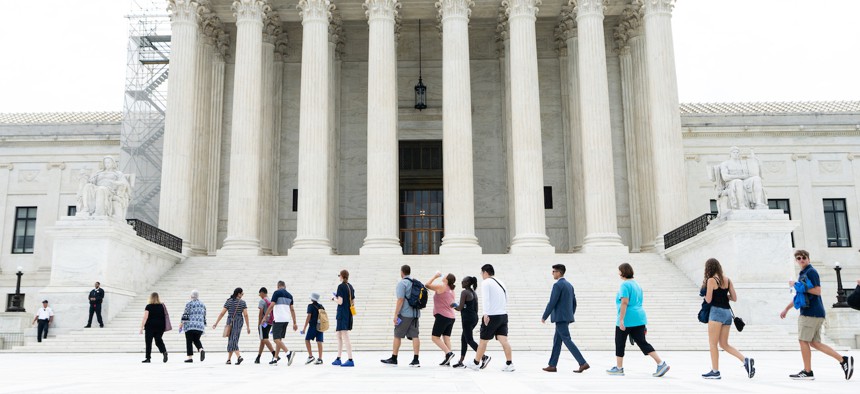
Visitors file into the U.S. Supreme Court building on June 27, 2023. Monday’s dismissal came after a years-long saga that began during the Trump administration. Bill Clark/CQ-Roll Call, Inc via Getty Images
The Supreme Court tosses case over Trump hotel documents
The House Democrats who brought the case years ago moved to dismiss the case earlier this month.
After a years-long saga, the Supreme Court on Monday dismissed House Democrats’ lawsuit against the federal government’s landlord over documents relating to the former Trump hotel in Washington, D.C., that raised many ethical concerns when President Trump was in office.
The matter at hand was whether the lawmakers should be able to sue to obtain the documents related to the Trump hotel that was located in the Old Post Office building, on a lease from the General Services Administration from 2013 until the Trump Organization sold the lease last year.
“For six years, [Democrats on the House Oversight and Accountability Committee] sued GSA to expose Trump’s self-dealing and constitutional and ethical violations at his D.C. hotel, AKA ‘the Washington Emolument,’” the Democrats tweeted on Monday night. “After GSA produced nearly all requested records, we moved to dismiss. Today, SCOTUS agreed.”
In a statement on June 7 announcing their move to dismiss the case, Rep. Jamie Raskin, D-Md., ranking member of the oversight committee, said, “Oversight Democrats remain steadfastly committed to uncovering the extent of the wrongdoing by former President Trump and other members of his administration.”
GSA did not respond for comment.
The legal battle has spanned the Trump and Biden administrations. The late Rep. Elijah Cummings, D-Md., former chair of the House Oversight and Accountability Committee, initially led the charge, and some of the other lawmakers are no longer in Congress.
In 2017, a federal judge dismissed the lawmakers’ lawsuit, saying they didn’t have standing but then an appeals court revived it in 2020 (which the Supreme Court vacated on Monday).
In November 2022, the government appealed to the high court.
“Members of Congress have ample means, short of suing in federal court, for redressing official-capacity harms,” wrote Justice Department attorneys in their petition. Additionally, “there is almost no historical precedent for Members of Congress to even attempt to enforce unmet seven member rule demands through the federal courts.” The rule is a seldomly used 95-year-old law that allows seven members of the House Oversight committee to demand records from the federal government.
In opposing the petition, lawyers for the lawmakers wrote that since the need for litigation under the seven-member rule is “so rare there is no support for GSA’s speculation that it may become a breeding ground for abuse.” Additionally, “because GSA decided to treat the members’ requests as if they were made under the Freedom of Information Act, it eventually produced nearly all the information requested.”
The Supreme Court in May said it would hear the case and then a few weeks later the lawmakers sought to dismiss the case.
But now the question over the seven-member rule will not be taken up by the court at this time.







